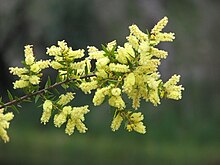| Spike wattle | |
|---|---|

| |
| Acacia oxycedrus, Bunyip State Park, Victoria | |
| Scientific classification | |
| Kingdom: | Plantae |
| Clade: | Tracheophytes |
| Clade: | Angiosperms |
| Clade: | Eudicots |
| Clade: | Rosids |
| Order: | Fabales |
| Family: | Fabaceae |
| Subfamily: | Caesalpinioideae |
| Clade: | Mimosoid clade |
| Genus: | Acacia |
| Species: | A. oxycedrus
|
| Binomial name | |
| Acacia oxycedrus | |

| |
| Occurrence data from AVH | |
Acacia oxycedrus, commonly known as spike wattle,[2] is an erect or spreading shrub which is endemic to Australia.[2]
Description[edit]
The prickly shrub grows to a height of 1 to 3 m (3 ft 3 in to 9 ft 10 in) and has a width of around 2 m (6 ft 7 in)with a dense habit.[3] Like most species of Acacia it has phyllodes rather than true leaves. The dark green, rigid and sharp-pointed phyllodes have three or four prominent longitudinal veins. The bright yellow to pale yellow cylindrical flowerheads appear in groups of one to three in the axils of the phyllodes from July to October, followed by straight or slightly curved seed pods which are 4 to 10 cm (3.9 in) long and 3 to 6 mm (0.12 to 0.24 in) wide.[2]
Distribution[edit]
The species occurs on sandy soil in dry sclerophyll forest or heath in South Australia, Victoria and New South Wales.[2]
Cultivation[edit]
The shrub is available commercially but can be propagated by seed scarification or using boiling water. It grows well in open sun and in a well drained position in most soil types. It is frost hardy and useful for road batters or as a screen or hedge plant that will form an impenetrable barrier.[3]
See also[edit]
References[edit]
- ^ "Acacia oxycedrus". Australian Plant Name Index (APNI), IBIS database. Centre for Plant Biodiversity Research, Australian Government, Canberra. Retrieved 29 August 2009.
- ^ a b c d "Acacia oxycedrus". PlantNET - New South Wales Flora Online. Royal Botanic Gardens & Domain Trust, Sydney Australia. Retrieved 30 August 2009.
- ^ a b "Acacia oxycedrus Spike wattle". Wattles - Genus Acacia. Australian National Botanic Gardens. Retrieved 31 March 2020.


